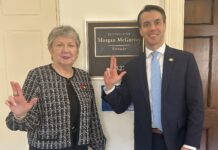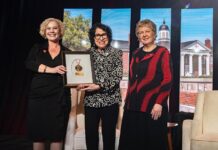
Whether you became a Cardinal in the late 1980s or you just made it through the pandemic year of online learning, you may not realize that you likely owe a debt of gratitude to Gale Rhodes and her staff.
The vice provost with a can-do attitude has worked in many forms of UofL academic affairs and services throughout the 35-year tenure that ended with her June 30 retirement. In recent years, Rhodes had the additional title of executive director of the Delphi Center for Teaching and Learning.
“People knew if you gave me something, it got done – and I enjoy that reputation,” Rhodes said.
“She has grown a small Delphi Center program into a juggernaut that offers expertise including instructional design, pedagogy/college teaching, higher education administration, IT, disability services, program and administrative support, conference and events services and sales, enrollment counseling, marketing and finance,” Provost Lori Stewart Gonzalez said. “The most recent addition to the Delphi Center is Military and Online Initiatives, an area that was created to lead institutional efforts to support on-campus and online military-connected students.”
Rhodes is quick to credit her staff members, who number close to 60 and who share her viewpoint that “at the end of the day, we need to do excellent work,” she said. She is proud of what they’ve accomplished together.
“The beauty of my unit is we are a service unit, and my staff thoroughly understands that,” she said.
When Rhodes arrived at UofL, she established and coordinated the freshman orientation course and soon served as director of academic services, earning her UofL doctorate along the way in counseling and college student personnel in 1994. She also had responsibility for UofL’s Quality Enhancement Plan meant to enhance critical thinking skills to address real-world problems.
Over the years Rhodes assumed more and more responsibilities and assignments in the evolving areas of professional, distance and continuing education and, ultimately, the burgeoning field of online education.
And, although the processes were well in place beforehand, at no time was the importance of online education more important or visible than when UofL needed to shift to remote learning mid-spring semester 2020 because of the COVID-19 pandemic.
“I knew our staff and I knew we were structured in such a way we could turn on a dime,” Rhodes said. Her message to her team was simple: “We’ve got to bring our faculty online for our students.”
“This is our opportunity,” Rhodes recalled saying to a team leader. “This training has to be outstanding.”
Rhodes said the unit also assessed along the way to ensure it was meeting faculty needs and ultimately the learning outcomes for students.
“I think we rose to the occasion,” she said. “People saw the value of what we have to offer them.”
The Delphi Center also has concentrated on working with faculty within their colleges or academic departments for better coordination of ways to deliver their subjects as peers. “You make a difference with people one at a time,” she said.
Most gratifying for her has been the reaction of some professors who’ve relied on the Delphi Center expertise in refining their approach to reaching their students, not only during the pandemic shift.
“The number of people who’ve said they’ve changed the way they teach….,” Rhodes said. “Working with my staff has made them better teachers. That’s been wonderful.”
She praised the “faculty who are willing to grow and learn,” adding that most people are most comfortable with teaching the way they were taught.
“I am grateful to those who are open to learning new ways to deliver education,” she said.
Delivering online education now can even mean offering entire graduate programs that way. Rhodes credits deans and other administrators who show leadership and understanding of what it takes to market to adult students who might have some college credits but lack a full degree or who need more education through an advanced degree. Those adults often are juggling families, full-time jobs and locations outside Louisville with their need for coursework – and for them, online is the way to a brighter future and more opportunity.
Rhodes cited the online master of business administration degree and the university’s new, first fully online doctorate in social work as examples of ways UofL is trying to reach different populations and bring them to the university through online curriculum in a stiffly competitive market.
Rhodes leaves the university proud of what she has accomplished with her staff and hopeful about the future.
“I think the university is really poised to move forward, and for me that’s really exciting,” she said.


































